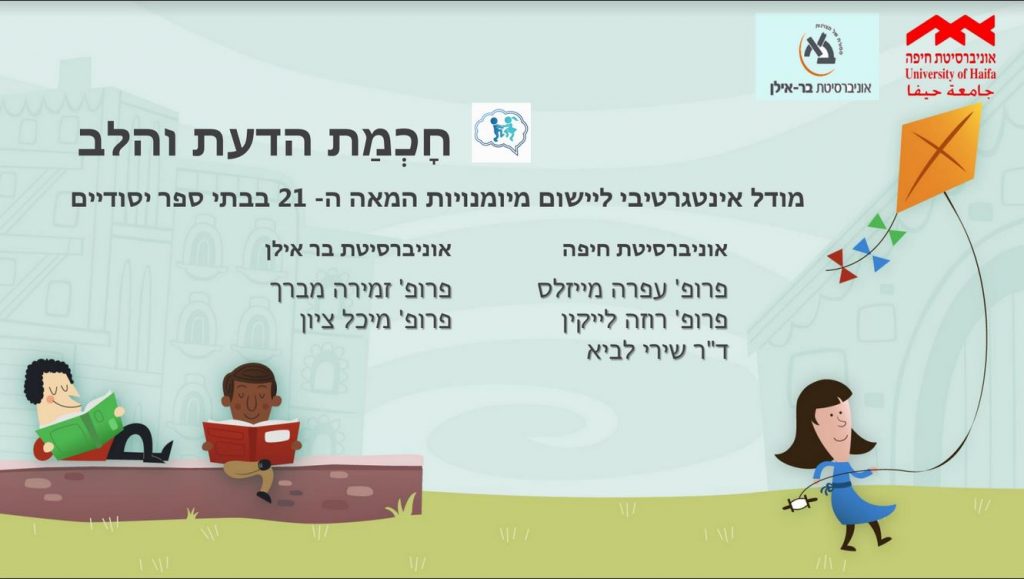
Center for Research Excellence: Meaningful Learning
Teaching with the Heart and Mind
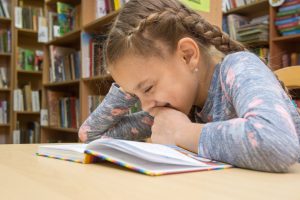
This innovative research project has won a call for proposals, issued by the Ministry of Education and funded by the Israel Science Foundation, for the creation of a national center of excellence for the teaching of 21st century skills. The project is one of the many various activities of the Center for the Study of the Human Spirit, a multi-university center based at the University of Haifa (currently under construction).
The main objective of this groundbreaking project is the development of an integrative model for the teaching of 21st century skills, which may then be implemented in elementary schools across Israel. 21st century skills are skills of the heart and mind, assumed to be particularly needed in the next few decades. What makes them unique is that they are based on one’s functioning as a “whole” person, combining both emotional and cognitive aspects. These skills, such as listening to yourself and to others, self-reflection, emotional regulation, empathy, creative thinking and critical thinking, are at the core of what sets us apart as humans. This is the reason this special project is called “Teaching with the Heart and Mind”, as it highlights the integration of these two complementary aspects.
It is now widely accepted that a major challenge for education systems around the world is the imparting of 21st century skills to the younger generation. While the skills themselves are well-defined, little is known about how to impart them to young men and women. Valid and reliable data on how to do so in schools is especially sparse, and not for lack of trying. In fact, several programs have been attempted in various places around the world, with some success. However, most of these programs focused on a single ability in one educational field (e.g., metacognition in math studies), or a small number of abilities, such as pro-social interpersonal relationships. Thus, there is still no clear data or a research-based model identifying effective methods for the teaching of 21st century skills as a whole in the school context.
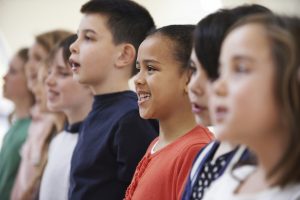
Therefore, the Ministry of Education and the Israel Science Foundation (the main and most prestigious public platform for funding academic research in Israel) have issued a joint call for proposals for a center of excellence, which will develop a research-based model for the teaching of 21st century skills in Israel. The main objective of this initiative is to develop a model which will be implemented in all Israeli schools after the conclusion of the study. Two institutions have joined forces to rise to the challenge: the Faculty of Education in the University of Haifa, and the School of Education in Bar-Ilan University. The team is headed by Prof. Ofra Mayseless from the University of Haifa. It also includes Prof. Roza Leikin and Dr. Shiri Lavy from the University of Haifa, and Prof. Zemira Mevarech and Prof. Michal Zion from Bar-Ilan University. Our aim is to address the issue in a manner which is thorough, comprehensive and research-based, and which involves cooperation between researchers and practitioners in the field.
Objectives of the “Teaching with the Heart and Mind” project
- To reach a deeper understanding of the change processes required for the teaching and learning of 21st century skills, as well as for the implementing of the holistic approach in schools.
- To develop an integrative, research-based model tested on a large sample, which can promote sustainable, wide-reaching changes in the social, emotional and cognitive domains in elementary schools.
- To suggest a model for the training of educational practitioners who will implement the model in additional schools (“scaling up”).
Co-Researches of the project:
Prof. Ofra Mayseless, Dr. Shiri Lavy, Prof. Roza Leikin – University of Haifa
Prof. Zemira Mevarech, Prof. Michal Zion – Bar-Ilan University
What is the problem? And why should we teach 21st century skills?
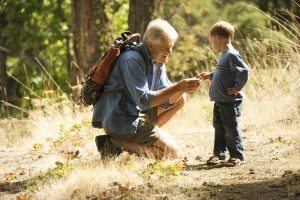
Current educational systems have come under increasing criticism in recent years, not only in Israel but in the world at large. The information revolution, making information far more accessible, as well as increasing the amount and rate of stimuli we are exposed to, challenges everything we knew about education and schooling.
With changes being so rapid, it’s hard to predict what today’s first-graders will be facing when it is their time to join the work force. It is therefore unclear how to teach and educate today’s youth – what will they need to know? Which professions will be available to them? How can teachers prepare our sons and daughters for the future, when no one really knows what it will look like and what it will require? Indeed, we now see more and more reports and programs, among them a U.S. federal report by the National Research Council, as well as the OECD’s Horizon 2030 report, which maintain that current teaching methods must be changed – not only the subjects offered, but also the way in which they are taught.
These reports stress the importance of teaching young people skills that will serve them no matter what the future holds, as they contribute to basic human functioning and fulfillment of one’s potential, and are transferable across fields, disciplines and professions. These skills have been referred to by various names in the different reports, as well as in Israel, depending on who you talk to, but mostly they are referred to as “21st century skills”.
The reports advocating teaching of such skills propose a complete transformation of both educational goals and teaching methods. For example, a major position paper published by the OECD in 2018 defined its educational goals for 2030 as follows:
“We are committed to helping every learner develop as a whole person, fullfil his or her potential and help shape a shared future built on the well-being of individuals, communities and the planet.”
Note that what is highlighted here is not evaluation of students’ performance in various fields, but fulfilling their potential and contributing to their well-being. Thus, according to this approach, education should focus on instilling and developing skills and abilities which are at the core of our essence as humans, and would therefore be useful even in a world very different from our own. And no, we are not talking about technological or computer related skills, as often mistakenly assumed. In our “age of information”, young people usually learn such skills intuitively, with no need for formal instruction.
“21st century skills”, as they are most often called, can be grouped under three types of abilities, considered essential for the success and self-fulfillment of young people in the 21st century:
Intrapersonal skills: self-confidence, self-efficacy, the ability to listen to and understand yourself, the ability to identify what matters to you and act out of intrinsic motivation, being able to recognize and regulate your feelings, and being able to regulate your behavior.
Interpersonal skills: listening to others, empathy, cooperation, teamwork, and the ability to solve interpersonal conflicts.
Cognitive skills: metacognition – the ability to think about your thoughts, creativity, flexibility, knowing how to solve problems – especially complex ones, the ability to explain and conceptualize, and critical thinking.
Of course, in order to help students acquire these abilities, we must make some dramatic changes in teaching methods and the school climate.
- We need to promote caring, respect, appreciation and trust among all those taking part in the educational endeavor, with each one experiencing both the giving and receiving of care and empathy.
- We must allow teachers and students a certain autonomy and freedom to make decisions and choose their activities for at least part of the school day.
- We should provide the students with space and quiet time for self-reflection and contemplating “life’s big questions”.
- We must treat each individual as a whole person, rather than only viewing them through the scholastic lens, by using a variety of methods to learn and get to know ourselves and the world.
We need to give experiential and diverse teaching methods center stage, and include elements such as emotions, the body, art and nature in the learning process. Focusing strictly on verbal channels for learning, as we do now, does not allow young people and their teachers to fully express their talents and their whole selves. It is as if we chose to only help children strengthen their right hand, rather than their whole body.
The model proposed by the Teaching with the Heart and Mind Project is just that. It is based on a humanistic approach, which believes in people and their abilities, and on a holistic, integrative view of the school, its teachers and its students. In accordance with this holistic view of the school, as if it were a live “organism” whose functioning depended on all of its parts, all teachers in the school will take part in the program. This approach is also fitting considering the smaller, more intimate character of elementary schools, as compared with more advanced schooling. Based on the view of the student as a whole person, the model will encompass all three spheres: emotional, social and cognitive. The model will also include organizational consultation for the school’s principal and executive staff.
However, the most defining characteristic of the model we propose is that it places the teacher – as a whole, multi-faceted person – in the center; that is, the “teachers first” approach (Palmer, 1997). Many educational intervention programs focus on pedagogical aspects, such as how to teach current or additional curricula, and are often viewed by the teachers as an additional burden on top of their usual duties. In contrast, the project’s innovative model holds that “you teach who you are” (Palmer, 1997), and therefore the teachers’ inner world, their ability to empathize, self-reflect, and listen to themselves and others, their cognitive flexibility, and ability to plan ahead are crucial if we intend them to impart such abilities to others. This is what we mean by “Teaching with the Heart and Mind”. Accordingly, the proposed two-year program will first and foremost view the teacher as a person, and focus on their own acquisition of 21st century skills, thus contributing to their personal and professional development.
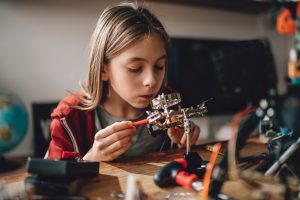
In this study, we intend to address a major challenge confronting the education system in Israel (and the world at large): identifying the most effective way to teach young people these 21st century skills. The project consists of a meticulous, wide-ranging study, which will utilize insights from previous studies, and allow us to identify the optimal intervention model for Israeli elementary schools. The suggested model (or parts of it) will be implemented in a relatively large number of schools (approx. 35) from different sectors, varying in socioeconomic status and religious orientation (secular/religious), in a manner which will make it easier to later apply it to additional schools.
The study and the model it employs are based on a holistic, integrative view of the school, the teacher and the student. Therefore, all teachers in the school will take part in the program. This approach is also fitting considering the smaller, more intimate character of elementary schools, as compared with more advanced schooling. Based on the view of the student as a whole person, the model will encompass all three spheres, and the study will examine whether an intervention combining social, emotional and cognitive skills is indeed more beneficial than an intervention including only social and emotional ones, or an intervention involving cognitive skills only.
In addition, the model will attempt to address one of the major problems in educational intervention programs – the sustainability of the impact of the program after the intervention or study have concluded. The model employs two main strategies to encourage sustainable change: first, involving the principal and executive staff in the program, helping them create a school climate which can support and promote the planned change in teaching methods; and second, focusing on the teachers and their own acquisition of 21st century skills, before they are to teach them to others.
Many educational intervention programs focus on pedagogical aspects, such as how to teach a particular curriculum. In contrast, the holistic approach of the study maintains that “you teach who you are”, and therefore the teacher’s inner world, his ability to empathize, self-reflect, and listen to himself and others are crucial if we intend him to impart such abilities to others. We call this “Teaching with the Heart and Mind”. Accordingly, the proposed two-year program will first and foremost view the teacher as a person, and focus on their own acquisition of the above skills, in a wider context. The next step in the intervention will focus on how to impart these skills to the students. The study’s research model will allow us to examine the effects of each of the different interventions – the social-emotional one with organizational consultation, the cognitive one with organizational consultation, and the combination of the above – on development of 21st century skills. This in turn will allow us to identify the unique and combined effects of each intervention and combination. Our hypothesis is that combining all three spheres (socio-emotional, cognitive, and organizational), as well as focusing on the teacher as a person, will create a transformative, sustainable change in the school, its teachers and its students. An additional hypothesis is that the change in the teachers themselves and their own acquisition of 21st century skills will act as a major mediating variable on the effect of the intervention on the students.
Method of the study
The study will consist of a four-year pilot study of 5 schools, and a three-year longitudinal and cross-sectional study of 30 schools, starting one year after the pilot is launched. The intervention itself will span two years, and a follow-up study will examine if any changes have occurred, and if so, how sustainable they are.
Repeated measures throughout the study, as well as qualitative analysis of the change process, will provide us with information about the schools’ progress, and allow us to change and adapt the process as needed. This data will be procured using questionnaires (for teachers, executive staff, and students from fourth-grade onwards) and structured observations. Thus, we will be able to assess the teachers’ classroom performance, and measure the pedagogical processes recommended in Pellegrino & Hilton’s 2012 report on developing 21st century skills, on which the original call for proposals was based. These will be measured using materials we will specifically design for this purpose, which will be another important contribution of the study.
About 5-6 cities and regional councils will take part in the study, and different types of schools will be sampled from each one. As the intervention is intended to correspond to the Israeli education system’s regular routine, it will be introduced during preparation day for the coming year, and then given as a professional development program (30 hours a year for two years). In addition, an advisor from the program will join the school’s staff meetings to assist in reflection on and implementation of the aforementioned skills.
The control group’s participation in the study will only consist of measurements, with no intervention. However, following conclusion of the study, schools in this group will also be eligible for the program (provided they receive authorization and funding from their city/council, as in the experimental groups). The intervention these schools will receive will be modified according to the insights gained from the study.
Following the conclusion of the study, this project, a cooperation between academic and field professionals, will offer an innovative, research-based model for the teaching of 21st century skills in elementary schools. It will be a model which has been tested in Israel, in a meticulous study sensitive to the needs and framework of the Israeli education system, and which will offer a humanistic, integrative and holistic view of teaching. As such, it will be characterized by a sensible balancing of mind and heart, emotion and cognition, and the needs of the present vs. the fascinating, unknown horizon of the future.
The project team
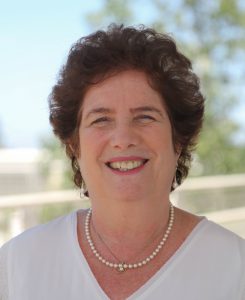
Prof. Ofra Mayseless Co-investigator from the University of Haifa. A professor of developmental psychology at the University of Haifa and a clinical psychologist. She has previously served as dean of the Faculty of Education and head of Pedagogical Affairs in the Ministry of Education. Formerly, she studied close relationships (romantic relationships, friendships, and especially parent-child relations) through the lens of attachment theory, focusing on the socio-cultural Israeli context and the transition to adulthood in Israel. She has also examined the motivational system involved in acts of caring, as featured in her book The Caring Motivation (Oxford University Press, 2016). She has published approximately 100 articles, chapters and books in a variety of publications platforms.
In the past decade and a half she has focused on the spiritual aspect of human development and the search for meaning. She is a co-founder of the Israeli Conference for the Study of Contemporary Spiritualities and of the Integrative Psychotherapy: Body-Mind-Spirit MA program at the University of Haifa. Recently, along with others, she has founded the multi-university Center for the Study of the Human Spirit.
Email: ofram@edu.haifa.ac.il
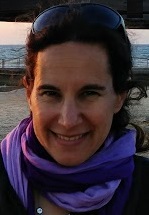
Dr. Shiri Lavy Co-investigator from the University of Haifa. She is a faculty member at the Department for Leadership and Policy in Education at the University of Haifa. Her research, which is conducted primarily from a positive psychology perspective, focuses on relationships, character strengths and their development, and sense of meaning. In recent years, she has studied the above topics mostly among teachers and education organizations.
Dr. Lavy’s work has been published in leading journals covering positive psychology, organizational psychology, and education. She is currently co-editor of the Journal of Happiness Studies, a member of the IPPA Education Division Steering Committee, and served as chair of the first Positive Education Preconference of the division in Budapest in 2018..
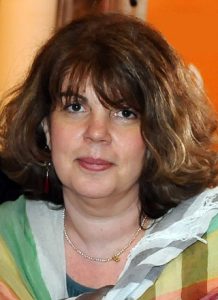
Prof. Roza Leikin A professor of mathematics education and gifted education in the Faculty of Education at the University of Haifa. Her work, in both research and practice, revolves around three interrelated fields: creativity and mathematical ability; knowledge and professional development of mathematics teachers; and mathematical challenges in education. Another field of interest is the contribution of neuro-cognitive research to the field of mathematics education.
Prof. Leikin is the head of the Department of Mathematics Education and the director of the RANGE Center – the Interdisciplinary Center for the Research and Advancement of Giftedness, which includes a neuro-cognitive laboratory for the investigation of creativity, ability and giftedness. During 2012-2017 she served as the president of MCG – the International Group for Mathematical Creativity and Giftedness (affiliated with ICMI http://igmcg.org). During 2013-2017 she was the head of the Mathematics Education Advisory Board in the Ministry of Education. She has edited 10 special issues of journals in the fields of mathematics education and gifted education, and has published more than 150 peer-reviewed articles in journals, books and conference proceedings. She established (in 2014) and currently leads Club 5, which organizes communities of practice for teachers of high-level high school mathematics, and now includes more than 350 teachers across Israel. She also leads two R&D projects, Steps to 5 and MathKey, which focus on teaching and learning in heterogeneous mathematics classes.
For more information, please see http://ps.edu.haifa.ac.il /roza-leikin.html
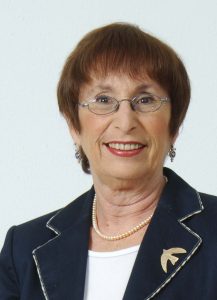
Prof. Zemira Mevarech is a professor emeritus at Bar-Ilan University. Her research has focused on metacognitive processes among students, from preschoolers to university students and teachers in training. She has developed a metacognitive pedagogy which is widely used in Israel and abroad, mostly in the fields of mathematics and science. She is currently serving as an expert in an OECD project dedicated to promoting creativity and critical thinking in schools, where she designs and studies a unique pedagogy for the development of these skills among students and teachers. In 2004 she was awarded the Landau Prize for her contribution to the study of education. She has published dozens of articles, is a member of the editorial board in four international journals, and has taught hundreds of students, some of whom now hold top positions in the Israeli education system. Her recent book, Critical Maths for Innovative Societies: The Role of Metacognitive Pedagogies (OECD, 2014) has been translated to Japanese and Spanish.
Prof. Mevarech has served in many executive positions, among them: head of the School of Education at Bar-Ilan University (two separate terms), chief scientist at the Ministry of Education, head of the Institute for the Advancement of Integration, head of an international research group in the European Association for Research on Learning and Instruction (EARLI), vice rector at Bar-Ilan University, dean of the Faculty of Social Sciences, and recently, president of the David Yelin Academic College of Education. She was senior researcher on a PISA research project in Israel, the academic head of the Division for Gifted and Outstanding Students, a board member of the Society for the Protection of Nature in Israel, and a member of the Taub Center for Social Policy Studies in Israel. She has also served on dozens of educational committees. Finally, alongside her many activities in the academic field, she also enjoys painting. Her paintings, which are abstract, bold and very colorful, have been displayed in exhibitions in Israel and abroad.
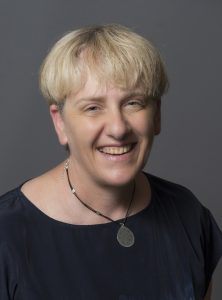
Prof. Michal Zion Co-investigator from Bar-Ilan University. She holds a PhD in the field of cancer research from the Hebrew University of Jerusalem, and is currently a professor of Science Education in the School of Education at Bar-Ilan University. She has previously served as head of the Science Education MA program, and is currently the vice director of the School of Education and head of the Biology Teaching program. She is also the academic head of the Center for Development and Support for High School Biology Labs, which provides an academic and technical framework for inquiry-based teaching of biology in Israel.
Prof. Zion’s research focuses on teaching and learning of inquiry, especially the dynamic and metacognitive aspects of the learning process. She also studies issues related to health education and environmental education, and collaborates with researchers in the fields of brain and life sciences. She has published dozens of articles in various prestigious platforms, and was awarded the Bar-Ilan Rector Prize for Scientific Innovation in 2017.
Email: Michal.zion@biu.ac.il
Ms. Shelly Rota
Project Coordinator/Cognitive Intervention Team
Dr. Nir Peleg
Cognitive Intervention Team
Ms. Savion Or
Socio-emotional Intervention Team
Mr. Shay Hanien
Socio-emotional Intervention Team
Mr. Ronnie Landau
Organizational Intervention Team
Ms. Einat Karniel
Organizational Intervention Team
Mr. Niv Greenspan
Cognitive Intervention Team
Ms. Rotem Levy
Cognitive Intervention Team
Dr. Niva Dolev
Socio-emotional Intervention Team
Mr. Ran Katz
Organizational Consultation Team
Ms. Yael Rubinstein
Organizational Consultation Team
Ms. Galit Hanien
Socio-emotional Intervention Team
Dr. Nurit Paz
Measurement and Evaluation Team
Ms. Eman Naama
Measurement and Evaluation Team
Ms. Iris Wolberg
Measurement and Evaluation Development Team
Dr. Rotem Maor
Measurement and Evaluation Development Team
Ms. Shiraz Raikin
Educational Psychologists Team
Ms. Lior Ariel
Educational Psychologists Team
Ms. Orit Goldstein
Educational Psychologists Team
Ms. Andra Raphaella Melul-Levi
Educational Psychologists Team
Mr. Zvi Shorek
Educational Psychologists Team
